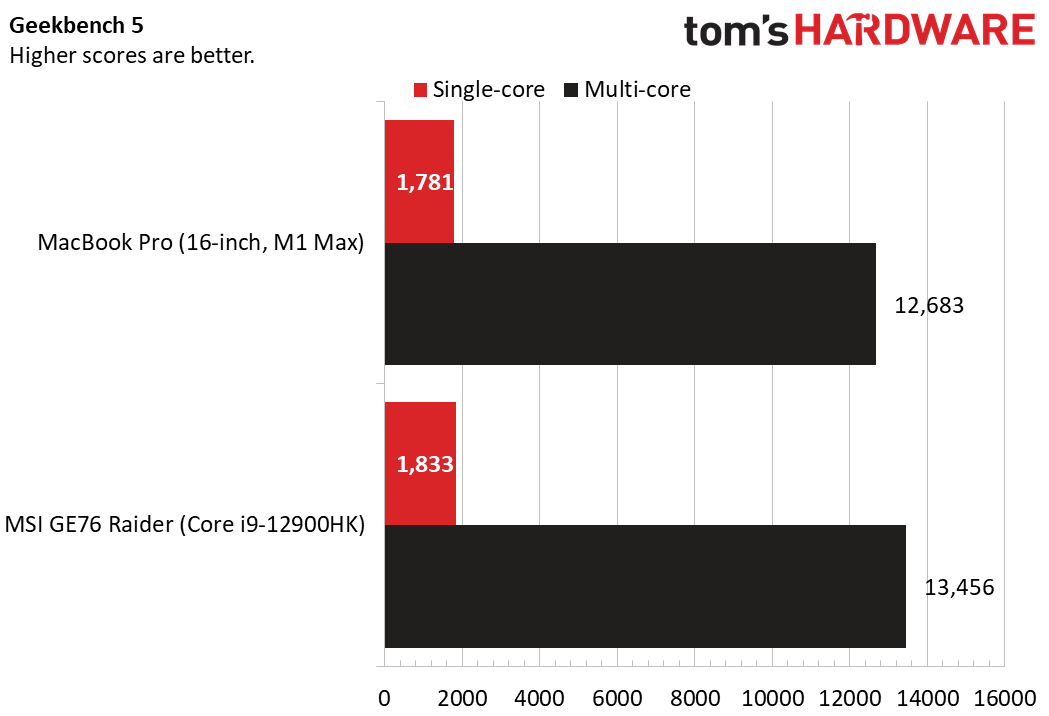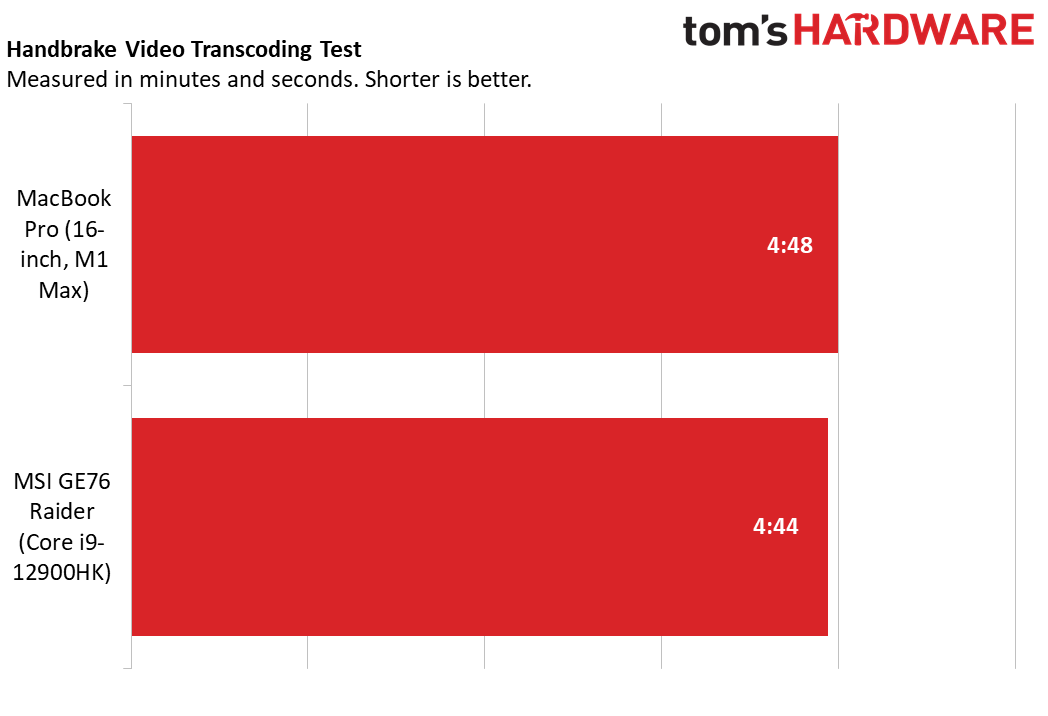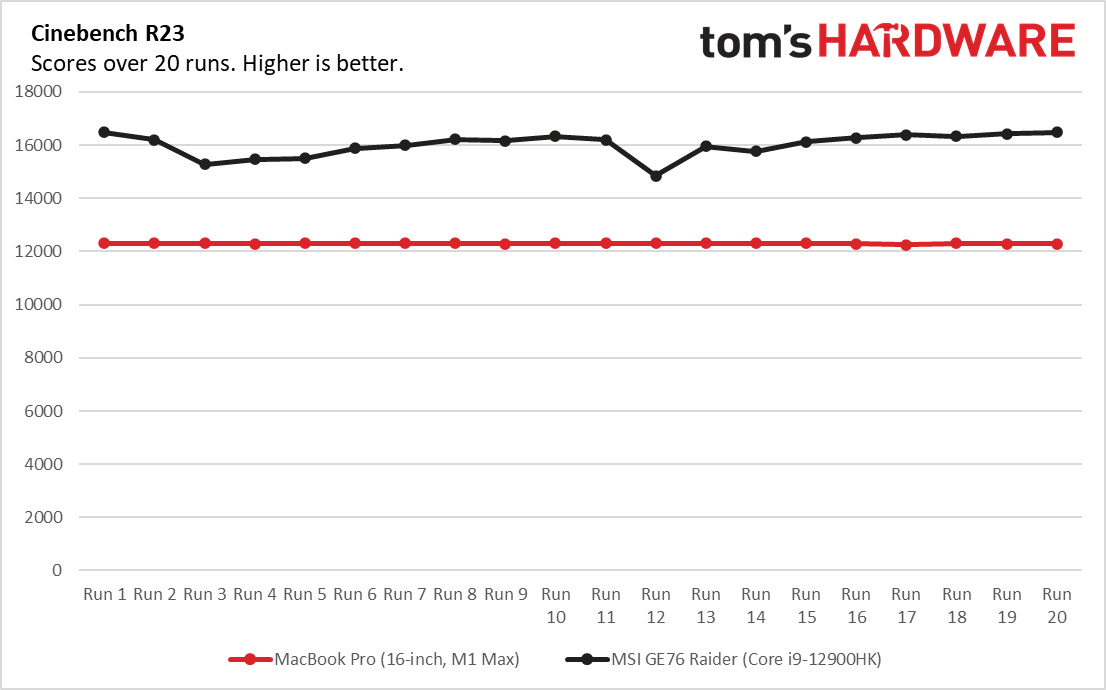Intel's Flagship Alder Lake Chip Beats Apple's M1 Max, But There's a Catch
Intel's latest Core i9-12900HK processor may just have won the mobile x86 vs. Arm performance war, but it comes at a cost. The mobile 14-core Alder Lake chip has bested Apple's M1 Max in multiple workloads, including a 30% win in a multi-threaded test, but the former is far more power-hungry than the latter.
We've already seen what the M1 Max can do in the latest 16-inch MacBook Pro, and the Core i9-12900HK, which powers MSI's latest GE76 Raider gaming laptop, isn't a slacker, either. Both processors leverage different architectures, with the Arm-based M1 Max residing exclusively inside Apple's closed ecosystem, so an apples-to-apples comparison isn't always straightforward. However, some benchmarks do work on both types of hardware, including Geekbench 5, HandBrake, and Cinebench R23, so we charted out a few comparisons from the tests we ran in our lab.
To be clear, the comparison between the two devices isn't ideal: The Core i9-12900HK resides inside the GE76 Raider, a device that's designed for maximum performance and has a beefy cooling subsystem to deliver on the goal of performance at (nearly) all costs. In contrast, the M1 Max rides in the Macbook Pro that's designed for creatives, developers, and the productivity-minded. We'll need to wait to see how Alder Lake performs in devices like a Dell XPS or Lenovo ThinkPad to see a more apples-to-apples comparison. There's also a pricing difference between the ~$3,999 GE76 Raider and $4,299 16-inch MacBook Pro we used for testing, but the pricing delta can vary based on the respective configurations. However, the comparisons below show us what Alder Lake is capable of in a mostly unconstrained environment, giving us some indication of the broader performance picture.



In our Geekbench 5 testing, the Core i9-12900HK outperformed the M1 Max by 3% in the single-core test and 6% on the multi-core test, so it wasn't a landslide. The performance delta in the HandBrake test was more negligible, though, as the Alder Lake chip only bested the M1 Max by four seconds, representing a 1% margin in the video transcoding workload.
In Cinebench R23, the Core i9-12900HK delivered up to 30% more performance in the multi-core workload than the M1 Max. The M1 Max scored between 12,261 and 12,313 points in 20 runs with a geometric mean of 12,300 points. The Core i9-12900HK, on the other hand, logged scores between 14,840 and 16,481 points, resulting in a geometric mean of 16,009 points. Again, we have to take the GE76 Raider's beefy cooling subsystem, which unlocks higher performance in sustained workloads, and its tuning into account here. It's possible that the M1 Max could deliver higher performance results with similar accommodations, though that would also come with some tradeoffs in power consumption.
Power consumption is just as important as pure performance, particularly when comparing mobile processors. Apple's M1 Max is the undisputed champ in that area, though. While Apple doesn't advertise a TDP value for the M1 Max, the Core i9-12900HK has a 45W base power and 115W maximum turbo power rating.
In Anandtech's review of the M1 Max, our sister publication registered a package power of 34W during the Cinebench R23 multi-core test. The reading from the wall was 39.7W. In our tests, the Core i9-12900HK consumed up to 94W in the same benchmark.
Get Tom's Hardware's best news and in-depth reviews, straight to your inbox.
For comparison, the MacBook Pro 2021 lasted 15 hours and 31 minutes in our battery test, whereas the MSI GE76 Raider survived for 4 hours and 5 minutes under the same environment. Admittedly, it's not the fairest comparison due to the hardware differences ) between the two devices, primarily in terms of battery capacity and the Alder Lake system's onboard GPU. Still, with the M1 Max exclusive to Apple's devices and the tech giant abandoning Intel chips, the comparison may be the best that we can do for now.
It's noteworthy that this Alder Lake-powered device is tuned for maximum performance, and there's a vast diminishing point of returns as the chip is tuned higher up the frequency/voltage curve. That means that more conservatively-tuned Alder Lake laptops could yield higher power efficiency, and thus longer battery life, but they obviously won't be able to close the massive gulf between the two chips.
Intel made great strides with Alder Lake, and the Core i9-12900HK was faster than the M1 Max. That, coupled with its broader compatibility with games, makes the Alder Lake chips more attractive to the gaming crowd. However, Apple's SoC was still more power efficient with almost 3X less power consumption than Alder Lake, giving the newcomer a massive advantage in battery life and the other side effects of reduced power consumption, like being a cooler and quieter device.

Zhiye Liu is a news editor, memory reviewer, and SSD tester at Tom’s Hardware. Although he loves everything that’s hardware, he has a soft spot for CPUs, GPUs, and RAM.
-
peachpuff A great man once said... "It don't matter if you win by an inch or a mile. Winning's winning."Reply -
-Fran- Reply
Except this isn't a drag race for Apple. They care about how you win. Do you think they want a thick as hell laptop for their Mac following? Apple must be laughing at this premise that Intel beat them by about 3% all around by using 3 times the energy. And the same will apply to whatever AMD can achieve with the Ry6H series; while better than Intel at power, I don't see them beating apple at power/performance. They'll be closer though.peachpuff said:A great man once said... "It don't matter if you win by an inch or a mile. Winning's winning."
So, as stated in the article, when these CPUs arrive to the 25W-45W range, then it'll be an interesting comparison.
Regards. -
watzupken It is not a clear win for Intel. Alder Lake is certainly a fast chip, but the jump in performance is to a large extend due to the much higher peak power draw. And when you are talking about a gaming laptop, the moment you unplug the laptop from the mains, the performance plunges big time. The Macbook Pro works and performs the same whether plugged in or on battery. As a desktop replacement, gaming laptops makes sense because not only is the laptop big and heavy, you need to lug along the 1 or sometimes 2 power adapter which are not small, not light to begin with. On the other hand, one can charge the MacBook Pro even with a 65W type C charger.Reply -
King_V A couple of percentage points, at the cost of vastly greater power consumption?Reply
Or, at best, maybe that "up to" 30% gain in CinebenchR23 - relatively wide variance in multiple runs... The M1 has a variance of only 52 points, and the Intel a variance of 1641 points... suggests it's not able to keep the wick cranked all the way up that steadily to me.
It doesn't say if the 94 watts from Intel is package power, or from the wall. If from the wall, than compared to the M1, it uses 136.8% more power.
If it's package power, Intel is using 176.5% more power.
Yeah, this is pretty laughable. -
peachpuff Reply
A great man also once said... Second place isn't winning.-Fran- said:Except this isn't a drag race for Apple. They care about how you win. -
-Fran- Reply
Then let me rephrase. Apple's race is power/performance ratio and not performance; think drifting vs drag, if you will. They care about slim and sleek designs and whether you and I agree to that philosophy or not, is moot. Even by "winning" in performance, as long as their power is off the roof for mobile, Apple will just laugh at them. So no, winning at performance alone won't sway Apple to get Intel into the Mac again.peachpuff said:A great man also once said... Second place isn't winning.
Regards. -
King_V Replypeachpuff said:A great man once said... "It don't matter if you win by an inch or a mile. Winning's winning."peachpuff said:A great man also once said... Second place isn't winning.
I don't think that man/these men were really all that great. Sounds more like they were terribly misguided.
It's the same conundrum that exists for hot-rodders:
Cheap
Fast
ReliableYou can ONLY pick two.
That Intel didn't win. With the power consumption, it lost. Badly. We are, after all, talking about LAPTOP processors. -
spongiemaster Reply
If you ain't first, you're last.-Fran- said:Except this isn't a drag race for Apple. They care about how you win. -
spongiemaster Reply
Alder Lake destroys the M1 in most of the software I use, because it would have to run through some sort of emulation mode on the M1 if it worked at all. The saying is comparing apples to oranges. In this case, it's comparing Apples to PC's which for most people is useless. Mac hardware is basically becoming a custom designed and optimized console to run a few key applications on macOS. Intel and AMD have to support 30+ years of legacy software. One would hope the purpose built system would be more efficient.King_V said:That Intel didn't win. With the power consumption, it lost. Badly. We are, after all, talking about LAPTOP processors. -
waltc3 Interesting that you did not give AMD the same sort of comparison...;) Intel still is behind AMD in PPW. And in server chips, that's a huge win for AMD. I don't recall TH ever making that point, however...;) It's OK...I don't really care, but thought I would mention it...;)Reply
Do you guys at TH support links from the story pages to the forum topics anymore? They aren't showing up for me any longer at the end of your articles.